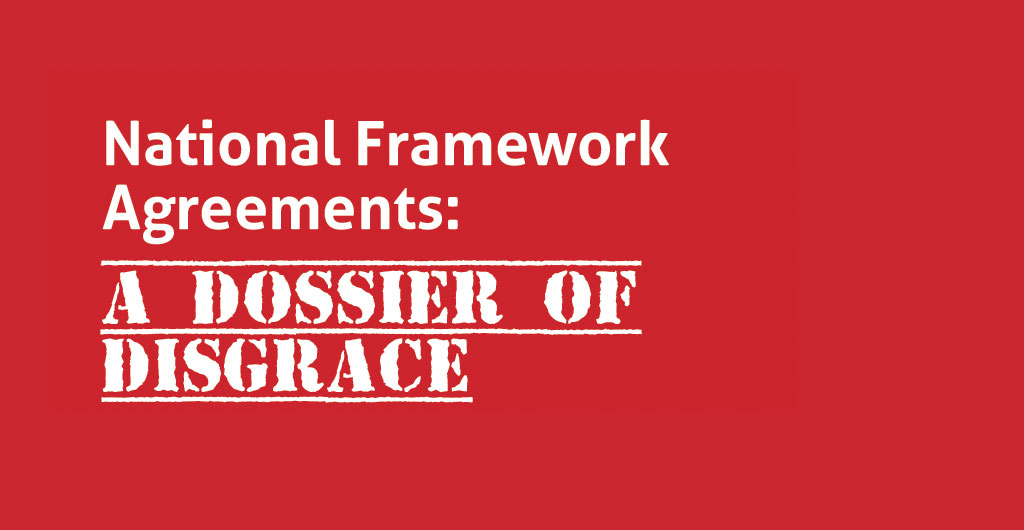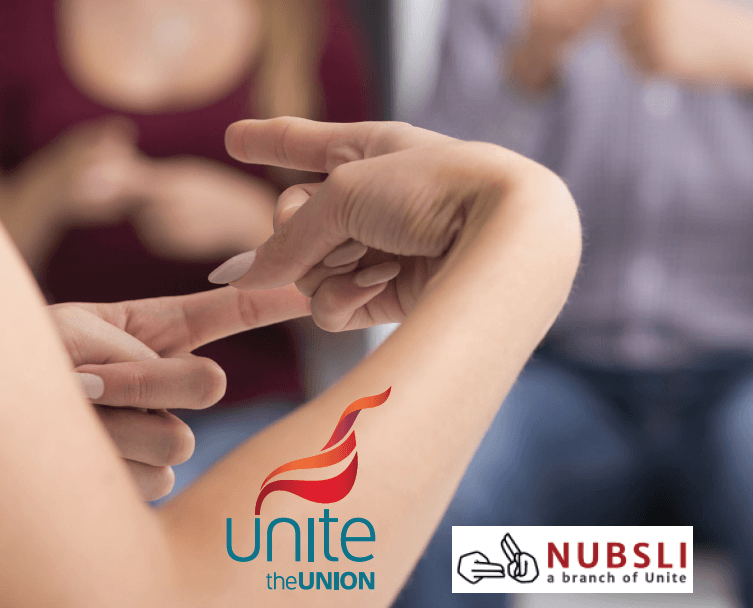National Framework Agreements: Dossier of Disgrace

Executive Summary
This Dossier of Disgrace was produced as a result of ongoing concerns raised by the National Union of British Sign Language Interpreters (NUBSLI) about the Government’s use of National Frameworks for the procurement of British Sign Language (BSL)/English interpreting services for public services.
National Framework Agreements have proven to be unworkable for all parties. It is an unfeasible business model for the agencies being awarded contracts, it is unsustainable for BSL/English interpreters and deaf customers have repeatedly been let down and have lost any choice and control over the interpreters they wish to use.
Introduction
NUBSLI was established in May 2014 as a result of government cuts to the Access to Work scheme. Interpreters were concerned that attacks on deaf people’s support would result in pressures being made on interpreters’ fees, terms and conditions. In safeguarding the sustainability of the profession, interpreters were able to ensure deaf people’s rights to high quality interpreting access.
BSL/English interpreters train for an average of seven years and are highly skilled professionals, many of whom are qualified to post-graduate level. They are regulated by one of three bodies in the UK: National Registers of Communication Professionals working with Deaf and Deafblind people (NRCPD), Regulatory Body for Sign Language Interpreters and Translators (RBSLI) and Scottish Association of Sign Language Interpreters (SASLI)*.
NUBSLI recommends only using the services of a regulated trainee or registered BSL/English interpreter through one of the three regulatory bodies, as this gives both the deaf and hearing client/s reassurance that the practitioner has undertaken the required complex and advanced training, is DBS checked and has the appropriate personal indemnity insurance (PII) in place. ID badges
should be visible during assignments to provide reassurance to both deaf and hearing people using an interpreter, that they are adequately trained and regulated.
The consequences of not using professional services can be far-reaching and, in extreme cases, life-threatening.
Current situation
There is currently a shortage of BSL/English interpreters. This was highlighted recently in Geneva (September 2017), when the Government were questioned over the shortage as part of the UNCRPD process. The British Deaf Association’s press release stated that:
In a landmark moment for deaf people in the UK, the UK government has been told by a leading UN committee that it must “ensure that legislation provides for the right to educated high-quality sign language interpretation…in all spheres of life”
In order to track any changes within the profession, NUBSLI has carried out annual surveys of BSL/English interpreters since 2015.
The 2015 results showed that a shocking 48% of interpreters were considering leaving the profession with 93% of these respondents having more than 10 years’ experience. Following the results of the 2015 survey, in March 2016 NUBSLI commissioned independent disability researcher Catherine Hale to produce a report on the findings of exit interviews completed by Sign Language interpreters (SLIs) between 19 November and 17 December 2015. It highlighted uncertainty as being the main concern facing interpreters working in the profession. The 2016 survey mirrored the results of the first.
In 2015 the (DWP) agreed to look at communication services (interpreting, speech to text, lipspeaking, etc.) for deaf people. NUBSLI agreed to be on the steering committee to ensure that the review would be as balanced as possible. The deadline for evidence was February 2016 but the report was not published until June 2017. Two significant events are not reflected in this document:
The liquidation of a large spoken language agency, Pearl Linguistics, who cited frameworks as one reason for their liquidation.
It is clear that frameworks are not a sustainable business model. The companies involved have no way of knowing how many customers they will get over what time period. Cash flow becomes an issue and paying end suppliers stops. Interpreters from all languages were owed and lost significant amounts of their income as a result of Pearl going into liquidation.
The boycott of another agency, LanguageLine Solutions (LLS), by interpreters in response to a large reduction in fees to unsustainable levels.
NUBSLI boycotted LLS from November 2016 after they tried to impose cuts of one third to interpreted fees. The boycott ended in July 2017 when they agreed to return the original rates of pay and terms and conditions.
It is worth noting that LLS attempted to source BSL/English Interpreters to cover the Sheffield bookings from as far afield as Scotland. We were informed at our first meeting with LLS that travel was payable by the NHS trust/CCG rather than the agency who held the contract; this would have meant considerable expense to the NHS and demonstrates how the use of frameworks offers no cost savings to the tax-payer.
We therefore do not believe that the DWP Marketplace Review is fit for purpose and it should not be used to guide procurement options.
NUBSLI are concerned that the Government intend to use framework agreements to procure services for BSL Access to Work users. As of April 2018, the amount awarded to an individual from the Access to Work scheme is being capped at £41,000. The expectation is that government will choose to create a call off under the CCS framework agreement to service these awards.
This is a worrying development as choice and control for deaf individuals and the ability to choose a specific interpreter for a particular aspect of the job will diminish. We also anticipate that interpreters fees will be offered at below market rates in an attempt to mitigate the cap. This is not a sustainable and may result in more experienced interpreters leaving the profession. When the Government has already been asked to acknowledge a shortage of interpreters, this course of action would exasperate the situation, worsening access for deaf people in the UK.
National Framework Agreements
In December 2014, a notice was placed in the Official Journal of the European Union (OJEU) stating the Government’s intent to establish national framework agreements for interpreting – including sign language. The whole concept of frameworks is that they can provide cost savings. By buying in bulk, it is expected that savings can be made via increasing competition in the market and what is known as gainshare by which any savings are passed back to government. This model doesn’t work for services provided by professionals, whose overheads do not diminish. NUBSLI were forced to establish a #ScraptheFramework campaign in order to be involved in any discussion with the Government body responsible for the frameworks, who refused to engage with us prior to this. They dismissed many of the concerns we raised ahead of the framework being tendered.
There are currently three national framework agreements:
- Crown Commercial Services (CCS)
- Ministry of Justice (MoJ)
- NHS Shared Business Services (NHS SBS)
NUBSLI has several serious concerns that impact deaf people’s ability to access public services. These are:
- Unsustainable, below market rates being offered
- Unqualified individuals being provided under contracts instead of qualified interpreters
- Unethical practices by agencies
- Inexperienced interpreters being used in inappropriate domains (e.g. court interpreting)
- Unqualified and unregulated deaf relays being used in court settings
- Lack of accountability for deaf people wishing to complain
- No recourse to complain about agencies
- Unsafe practices – interpreters being asked to work without coworkers, placing their health and safety as risk
- Agencies falsely stating that named interpreters have been booked for assignments (damaging their professional reputation)
- Video relay interpreting being used in unsuitable situations and not accounting for users’ needs
- No interpreters being provided for statutory services (e.g. child protection meetings, court, medical appointments)
There has been a lack of meaningful consultation with either the deaf or interpreting communities. Subcontracting has become commonplace and is a waste of taxpayers money adding unnecessary layers of bureaucracy and meaning that specific requests made on original bookings do not get passed on. There has been a huge increase in the number of interpreters requesting support from NUBSLI for help with late payments. We are sending an average of three ‘letters before claim’ a week to agencies. This again will have an impact of the sustainability of the profession with many interpreters being unable to afford to continue in their chosen careers.
Conclusion
To summarise, framework agreements are hugely damaging to our profession and will have a devastating impact on deaf people’s lives with this barrier to access. The Government has already recognised that there is a shortage of BSL/English interpreters; the continued use of frameworks is only going to exacerbate this.
Summary of recommendations
- Investigate the role of the agencies in providing a vital service to vulnerable adults in the public sector
- An EHRC/Cabinet Office investigation into the provision of sign language interpretation – to include consultation with deaf communities and interpreting organisations (including NUBSLI)
- to include an assessment of unmet need where interpreting services have not been supplied
- to include an assessment of the wasted cost of private companies’ involvement in the provision of services
- Cabinet office review of the Framework Agreements which govern the provision of interpreting and translation across local and central government including other statutory bodies e.g. NHS, Police and HMTCS
- Establish minimum standards for the provision of BSL/English interpreting services which meets the requirements of the Public Sector Equality Duty to include:
- ensure any service provider uses only registered interpreters and supervised trainees interpreters
- ensure any unfilled bookings or cancellations are logged and records kept centrally so unmet need can be assessed
- ensure there is an accessible and transparent central complaints procedure by the service which is logged by NRCPD and the organisation
- ensure preferences by deaf people are recorded and met and if unmet are logged e.g. gender preference of interpreter when required at sensitive appointments
- state that for specialist types of interpreting, experience in that area is needed e.g. legal, mental health and social care interpreting
- re-establish direct booking of BSL/English interpreters by key public sector bodies e.g. NHS Trusts, Police, Courts, which would improve quality assurance
Addendum
The increase to the ATW cap had not been announced at the time of writing and on reflection was not added to this Dossier as it was felt this was largely irrelevant: any imposed cap on the scheme remains discriminatory towards those with higher support needs.
You can read the StopChanges2AtW statement on the DWP’s decision to increase the cap here and read NUBSLI’s stance here.
*Since publication, SASLI has been replaced by Scottish Register of Language Professionals with the Deaf Community (The Scottish Register) and a separate membership association called Scottish Collaborative of Sign Language Interpreters, or SCOSLI.
Download and read the full report (PDF)

